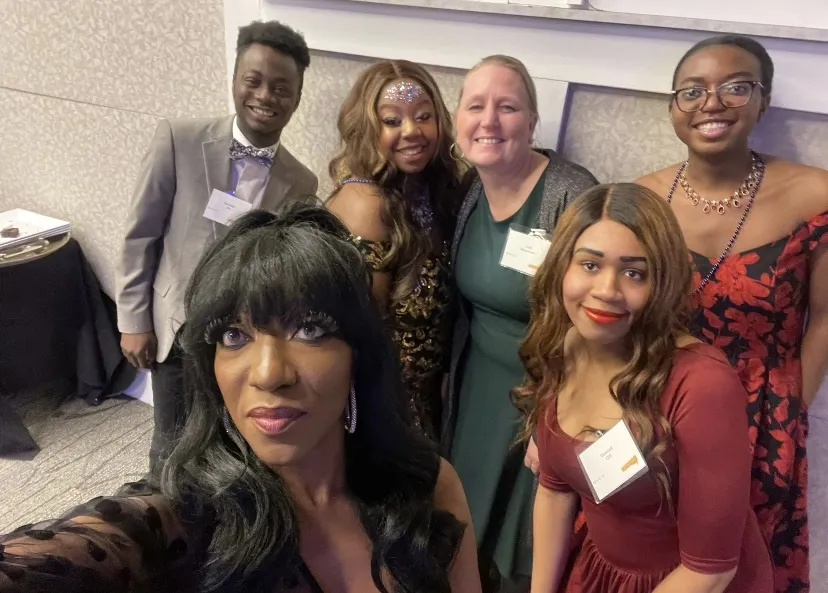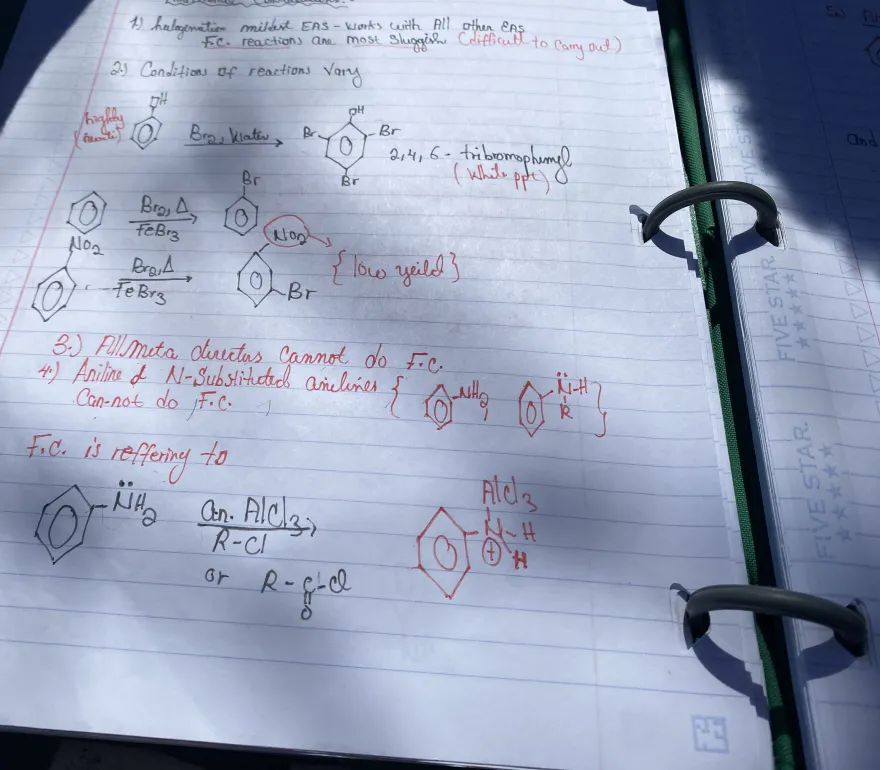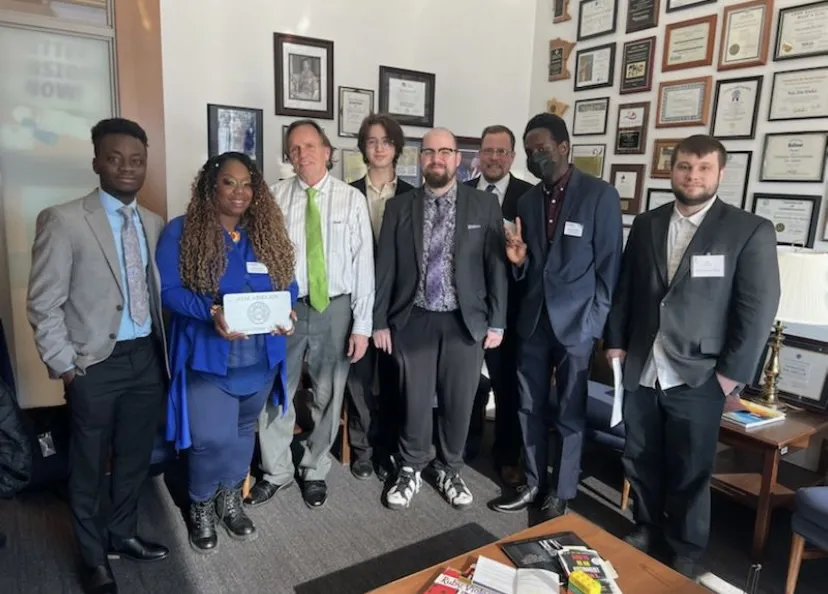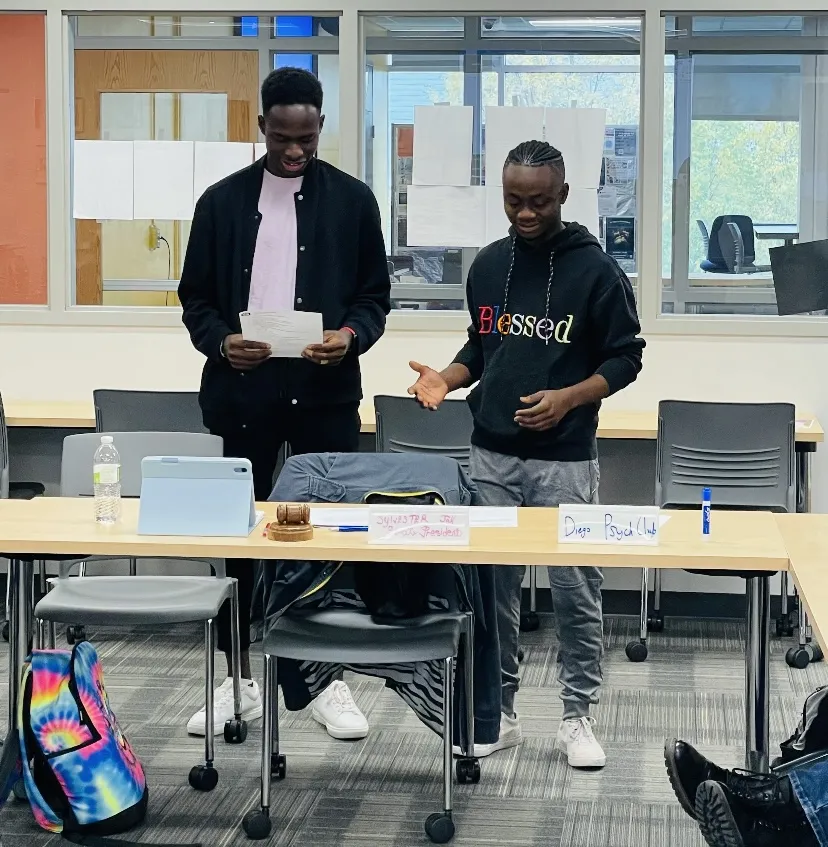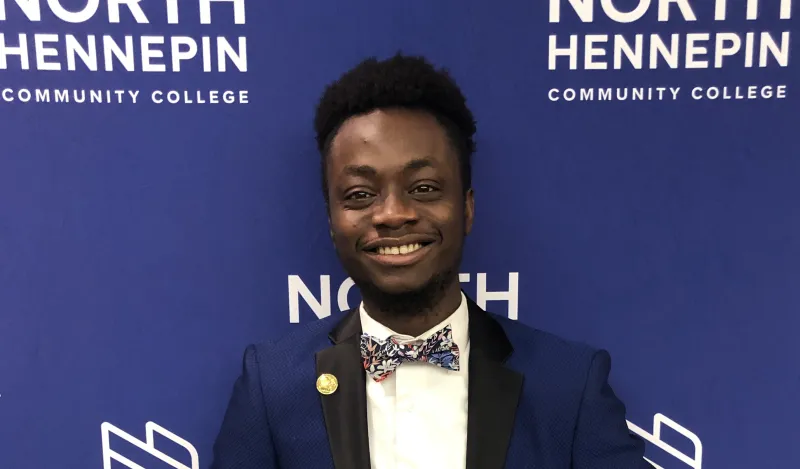
Sylvester Jah is a biology and liberal arts student at NHCC. He’s the kind of person who feels like a friend right away, even after just meeting him for the first time. Sylvester is determined, friendly and incredibly intelligent. He recently won NHCC’s Student of the Year Award and on top of that, he was chosen to represent his class as the 2024 Commencement Speaker.
"My hope is that at graduation, if there's one thing people walk away with, it's to be a person that you wanted to know. In retrospect just ask yourself: how can I reflect on my journey and stories to become that person that I needed in the past?"
-Sylvester Jah
Discover Sylvester’s story!
During high school, Sylvester fell in love with chemistry and set his sights on the pharmacy field. It took some searching for Sylvester to find the right school, but once NHCC was recommended to him, it clicked right away. He found supportive staff to help him achieve his goals and stay on track.
Over the past two years, Sylvester has dived into extracurriculars; he’s been president of Student Senate, a member of the Biomedical Science Club and is also involved at his church. He wanted to be part of something that forced him to speak out. Along with positive experiences in clubs and orgs, NHCC staff have assisted Sylvester too. He added, “The CARE Center counsellors helped me plan out a study schedule and NHCC advisors walked me through every semester until the end. I can ask questions and be supported. If I was just doing it on my own, I wouldn’t be where I am now.”
Upon graduation, Sylvester hopes to transfer to pharmacy school. The long-term care pharmacy field interests him because he enjoys building relationships with people over time. Sylvester feels a drive to help people. He wants to educate others on the pros of medication, while also informing them on their bodily effects. Sylvester looks forward to creating relationships with his patients and teaching his community about medicine.
Sylvester answers questions about his NHCC experience, pharmacist future and how he found his voice, below!
What did you study at NHCC?
I studied biology, chemistry and liberal arts.
You probably took all the biology and chemistry classes we had to offer here, right?
Yes. Well, I took a lot of them. Actually, yes. I did. I did take all of the chemistry classes and all of the biology classes that are offered by North Hennepin. I took all of them except for ecology. (I just couldn't figure out a time to do it. But my plan is to take it during the summer with Bemidji State, but still on campus here at NHCC). Yep, ecology that's the last class I need. I mean, I graduate in May and then I complete the biology degree in the summer.
Are you going to graduate with a biology degree?
Yes. And with a liberal arts degree. But, not chemistry. I’m not doing chemistry here, because I would have to do physics I and II, and I'm avoiding physics. I know I’ll have to take physics eventually, but for now, I'm graduating with two associate degrees in biology and liberal arts.
Do you have plans to transfer after you graduate?
Currently, I've been looking at different options. Originally, my plan was to take a gap year and just get some experience working or shadowing in a pharmacy, then apply the following year and then go to pharmacy school in fall of 2025. But now, since I've been looking at my degree audit report. I realized I only need 17 more credits to get a bachelor's degree in biology. Now I'm thinking instead of taking a gap year, I could still work part-time at a pharmacy and put the rest of my time towards completing those 17-credits as soon as possible through the Bemidji program. The classes would mostly be online and the ones that I have to do in-person, I’d take at NHCC with Andy Arsham.
How does getting into pharmacy school work?
To get into pharmacy school, you don’t need to finish a bachelor's degree, or even have an associate degree. They just need me to complete a certain amount of classes that were required as prerequisites and physics is the last one that I need to do and I'm avoiding it. I plan on applying for pharmacy school next year in July; and my application (for the most part) is already done. I just need to enter in physics as a class that's in progress and then I’ll answer the general essay questions that the schools I'm applying to have. Currently, I plan on applying to the University of Minnesota (that was the only plan for a long time). But in the past few weeks, I've been having conversations with people and they’ve been saying, “If an opportunity comes for you to move out of state, take it!” So now I'm leaving that door open. I’ve looked at Michigan State, UConn and North Carolina at Chapel Hill. Pharmacy school takes about four years to finish. By January, I’ll have a good understanding of the schools that I've been accepted to and I’m excited!
What excites you about being a pharmacist?
I think it's just the idea of being the expert of drugs. For the longest time, I've just been craving having that knowledge to help people. About five or six years ago, I had a friend who overdosed and if I had the concrete understanding that I do, I could’ve helped this person and been able to explain to them, ‘Hey, these drugs are good. They're made for a reason, but at the same time, they can be very detrimental based on how you use them.’ So yeah, from that standpoint, that's something that has been very fascinating to me. I’m just following this drive I have to help people. I want to help people learn more about medication and let them know that even though most medications are good, they can still affect our bodies. I want to make the people in my community more aware on the impact of medications.
A pharmacist differs from a psychiatrist. You don't get to know everyone’s backstory, but you still help people. Do you think it’s less stressful that way?
Yes. I mean, emotional wise, I feel like that would be bad for me personally, you know? Because sometimes I take on other people’s emotions too much. But in regards to pharmacy school, my plan after graduation is to work in a position where I can also build relationships with patients. I wouldn’t just be working at a CVS or a Walgreens; you know, maybe I'd be working in a hospital, or in ambulatory care, or I’d be an oncology pharmacist. That way, I’d get to see the patient over and over and be able to build that relationship, instead of it being, like, ‘Hey, I have a prescription I need to fill.’ I want that interaction with people, but I don't want too much all at once, I want to be able to build these relationships over the span of time.
How’d you get introduced to pharmacy, were you considering it before your friend’s incident?
Well, actually, yes. I moved to the states from Harbel, Liberia in 2015 and I went to high school for about two years. When it was time to graduate, I didn't know what I wanted to study in college; but there was a married couple at my high school who were science teachers, the Schreifel’s. The husband (Jeff) was my general chemistry teacher and the wife (Melissa) was my intro to organic chemistry teacher. I liked those two people so much! My high school graduation was quickly coming around the corner and I didn't know what I wanted to do. So, I had a conversation with the husband and I told him, ‘I really like chemistry, but I don't know what I want to do with it.’ We kept talking and he started giving me a lot of options of what I could do, he said ‘Oh, you could become a chemist, you could become a teacher, you could become a pharmacist…’ Overall, that was the option that sounded the most intriguing to me, because I knew I didn’t want to be a teacher. I knew all about the stresses that teachers go through and for me, sometimes after teachers explain things, I still ask like two, or three more questions, because I still don't get it. So, putting myself in those shoes, I felt like teaching could be very draining for me. Because of that I decided to go the pharmacy route.
Was there anybody at NHCC who helped you to uncover your passions?
Yeah! Actually, Paulette. She's no longer working at NHCC, but Paulette played a big role in helping me discover a lot of who I am today and the things that I aspire to achieve and the person that I aspire to be someday. There are a couple of NHCC professors too like, Eugenia Paulus and Tam Mans who I learned a lot from. (I'm naming those people and it's funny because their classes are not the ones that I did the best in. But I learned so much in those classes at the same time). For the most part, they have been super encouraging in my journey. They’ve made comments to me like, ‘Hey, you got this, you know, you can do it’ or ‘I saw your paper and I know if you did this one other thing, you’d be so close!’ Comments like that have intrigued me and pushed me in the right direction.
You said the classes you didn’t do the best in were the most helpful, why do you think that is?
Well, for one, those are hard classes, but the main thing was learning how to study different materials. You know, the way you study for math is not the same as studying for organic chemistry. If you studied for biology by reading the book, you can’t just apply that study method to learning organic chemistry. For that class, you have to write everything out, like 100 times in order to get it. Biology requires a lot of reading. I’d say it requires reading and asking questions. In biology class we’re always asking why. For example, ‘Why is this happening? Why does this work this way? Why does moving the nucleotide this way affect the structure of this protein?’ Reading and asking questions has been the core of those classes and learning how to study for them is something that has been very helpful.
Do you feel like you have some artistic flare? Because it takes some creativity to draw those chemical bonds!
Oh, yeah! Those are cool. At the start of the semester, I was trying to find my stencil for drawing bonds that helps you draw shapes neatly. I figured it would be so nice to speed up the drawing process in class. But as time goes on, I’ll get more practice drawing and be even better at that.
As a pharmacist, do you actually have to draw those chemical structures in your daily life?
Yeah, I don't know about that! I'm thinking maybe in pharmacy school it would be helpful to draw them still and if you were to do a research project, you’d need to know how a certain interaction works. For instance, I just had an organic chemistry exam and we just mentioned this thing called Iota form. It's a chemical that reacts with another chemical called ketone, right? And there's another one called silver oxide that reacts with aldehyde, but common people wouldn’t just know those things, you know? Or even me, it took a long time for me to be able to just recall stuff like that; so mostly that's what the process is going to be like moving forward. But you have to practice. One thing we learned this semester in my organic chemistry class is, everything that we read about in our books that says, ‘This is going to react if you add water, or if you do this it is going to explode...’ People actually did those things! That's how they found out if you do this it will explode, they didn't just come up with those results theoretically. They had to do the experiments to back it up and then bring the theory up afterward.
Would you have guessed five years ago that you would be where you are now?
Actually, no. Because five years ago, there was so much that was different about me. The thing that I usually tell people about me back then, is that I felt more comfortable being places where nothing was required of me. I’d be in a room with people and just sit there in the corner, leave whenever I had to leave and no one knew I was there…stuff like that. When I think about that in comparison to where I'm at right now though, it’s so different! Back then I was just okay with just being there. I haven’t always been this extroverted. I like being able to communicate with people, but for the most part I’m pretty reserved, and in my own space. Over time, I realized that sometimes because of the way I am, I don’t speak up and I tried to break out of that cycle. I put myself in a lot of environments to be more social. There have been times when I’ve participated in things, and I don’t say much, but then when I leave, I think, ‘I should have said this!’
What changed?
I guess, at a certain point, I decided I needed to get more involved in things that are impactful, things that are bigger than me in some sense, you know, like standing up for other people. Because if everyone is just sitting in the back, then who gets to lead? I know being a leader can be very uncomfortable. I remember my first few meetings as the Student Senate president, I had to lead the meetings, and I always told Paulette, ‘This is awkward!’ I didn't like being the person up there. But then as time goes on, you just get more comfortable with it. I'm still learning, but for the most part, I feel like I am comfortable to go to a conference and put myself out there and be like, ‘Hey, this is who I am. Thank you for your contributions, I would like to network with you.’ But that would not be something I did five years ago. Even to the point where I would do bad in some classes, and I’d just tell myself to try working harder next time. I didn't understand what I did wrong. But I needed to go up to the professor, or someone in the class and say, ‘Hey, I'm struggling I need some help.’ This was something that I couldn't imagine myself doing, but speaking up would have helped me a lot back then.
Do you have advice for students who might be thinking of coming to school at NHCC?
I would encourage them to come here! One, because of the diversity and inclusion on campus and two, because it is big. There are lots of communities to get involved in and you can experience the diversity in them too. I also think the clubs and organizations that we have on campus can help students to settle in. Outside of the regular tutors and advisors, you have people who are part of the clubs with you, who can help you find resources. Meeting students like that will help you do better in your classes too. Even after you graduate from NHCC, some clubs and orgs will still be beneficial to you then. Like the Biomedical Science Club! I’m a science student and they’re always doing Science Fairs, letting us know about opportunities and new internships as they come up. These clubs help you to progress towards your goals.
How did you decide you wanted to become Student Senate President?
First, I started out as the Senate Secretary. But, going back to me being introverted and not speaking up enough, I wanted to be a part of something that would force me to speak out. I wanted people to ask me, ‘What do you think about this?’ I put myself in a situation where I no longer could be quiet anymore, I had to speak up. So, I did that last year and this year I got some really great feedback from people who were part of the Senate. They said, ‘Hey, you should run for Senate President. I think you’re gonna do great.’ For a while I was hesitant because I didn’t know what to expect. But it has been great and I can tell I've grown a lot!
Finally, what is your Commencement speech about?
I'm trying to make the theme of my speech, ‘Be the person that you once needed.’ Around Christmas time last year, I had a lot of time on my hands and I was reflecting on my journey. I was thinking about how back in high school, the Schreifel’s were really the people I needed in my life/high school journey and they directed me in the right path. And, coming to NHCC and meeting Paulette… she prepared me and gave me an opportunity for growth. So, my hope is that at graduation, if there's one thing people walk away with, it's to be a person that you wanted know. In retrospect just ask yourself: how can I reflect on my journey and my stories to become that person that I needed in the past? If there was someone who helped you financially, or maybe a helpful tutor you met when you were struggling with calculus. My speech is about reflecting on those people and giving thanks for them. I am still nervous about this speech, even though most people would probably think I’m not. But I overthink public speaking a lot! I also learned that the other students who were in consideration to give this speech and for the most part, all the previous graduation speakers had all taken public speaking class. I'm the one outlier! But yeah, it'll be fun. My plan is for everyone to feel a part of the speech and for everyone to be able to say, ‘Yeah, I can reflect on that.’ ‘I can imagine myself being that person,’ or ‘Yeah, I have a story that connects to what he said.’

